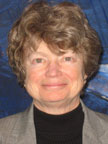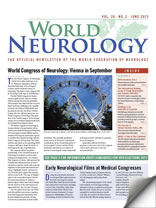Over the past decade, the WFN has evolved into a more ambitious, dynamic organization, with a clear mission and an energetic leadership. My goal as a trustee is to ensure the continuation of this growth and to expand the influence and effectiveness of the WFN.
I have worked in the WFN for more than 20 years in a number of leadership positions, including membership on the executive committee of the Education Committee, co-opted trustee, chairman of the Applied Research Committee, co-chairman of the Scientific Program Committee for the next World Congress of Neurology in Vienna, and membership on the World Health Organization’s (WHO) neurological advisory panel to revise the ICD-10 diagnostic codes. During those years, the global burden of neurological disorders has grown and aging populations have expanded in all parts of the world, requiring an increased allocation of health care resources to provide for those with stroke, dementia, epilepsy and other chronic neurological disorders. Methods of prevention or reducing the incidence of many of these disorders exist, but also require greater public health attention and implementation.
The WFN’s mission is the ambitious one of “fostering neurology and brain health worldwide.” It is uniquely able to promote this mission:
• Through its global membership, it can and does enlist the energies and abilities of some of the most able neurologists and neuroscientists in the world.
• Its cordial liaisons with the most influential international subspecialty neurology organizations can promote efficient collaborations in education, research and advocacy in a time of shrinking resources.
• The formation of the Global Brain Alliance offers an opportunity to international neurology, neurosurgery and psychiatry to speak with a single, powerful voice on behalf of those with brain disorders.
• Collaborative projects with the World Health Organization can focus attention on global neurological disorders and identify the need for training more neurologists in many parts of the world.
• WFN educational projects aimed at neurologists, primary care physicians and others demonstrate the many ways the neurology “knowledge gap” can be reduced.
As an elected trustee, my working experience with WFN leadership, familiarity with its committees and task forces, and commitment to the public health aspects of neurology will help the WFN use its alliances and resources to achieve specific goals. Expanding its partnerships with other global organizations will provide more funding for educational and research grants. Deepening our relationship with WHO will place neurological disorders more vividly onto the global health care agenda. Attracting more young neurologists into the WFN will ensure the growth of the organization. Reaching our goal of helping establish more neurology training programs in Africa will allow the WFN to identify other regions where neurologists are scarce and where support would be useful. Increasing the number of the WFN’s member societies, or of associate members from countries where neurologists are scarce and no society exists, should bring new perspectives and energy into the WFN.
International neurology as an area of research, education and training has only recently attracted wide attention. As this field grows, the WFN should continue to be at its center, a source of expertise, collaboration and experience. Its new slate of officers and trustees should be in a position to advance this agenda, to maintain the momentum of ongoing programs and to devise new ways to promote brain health.
